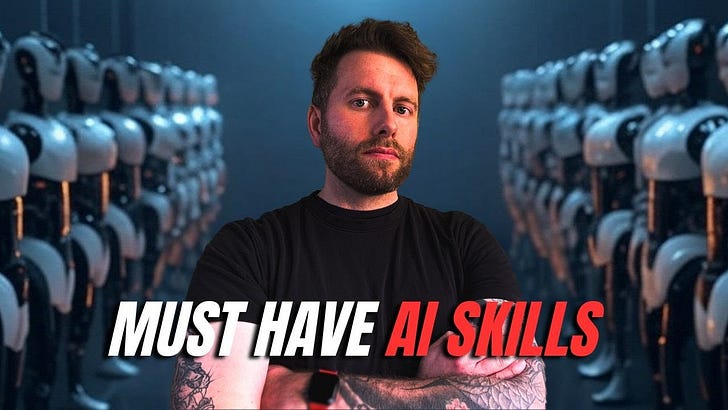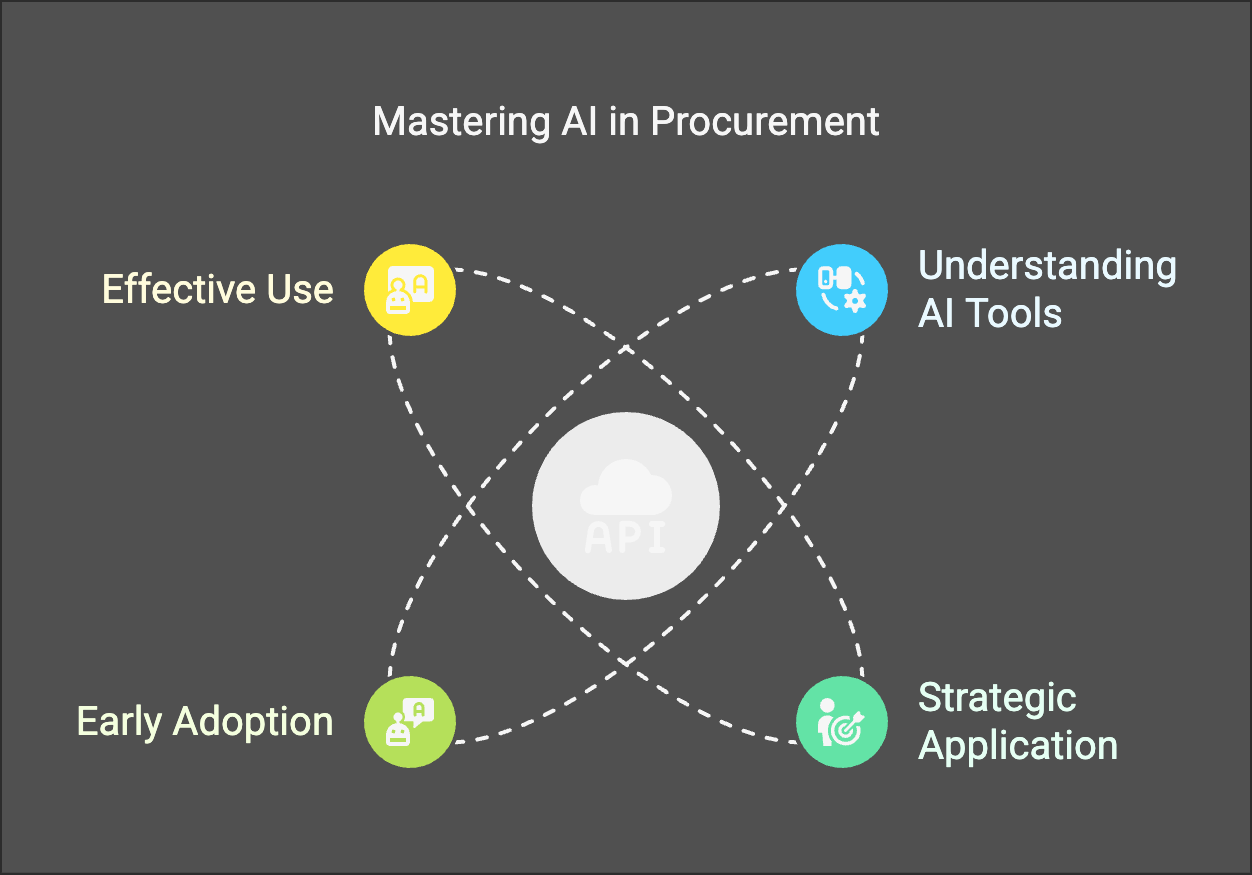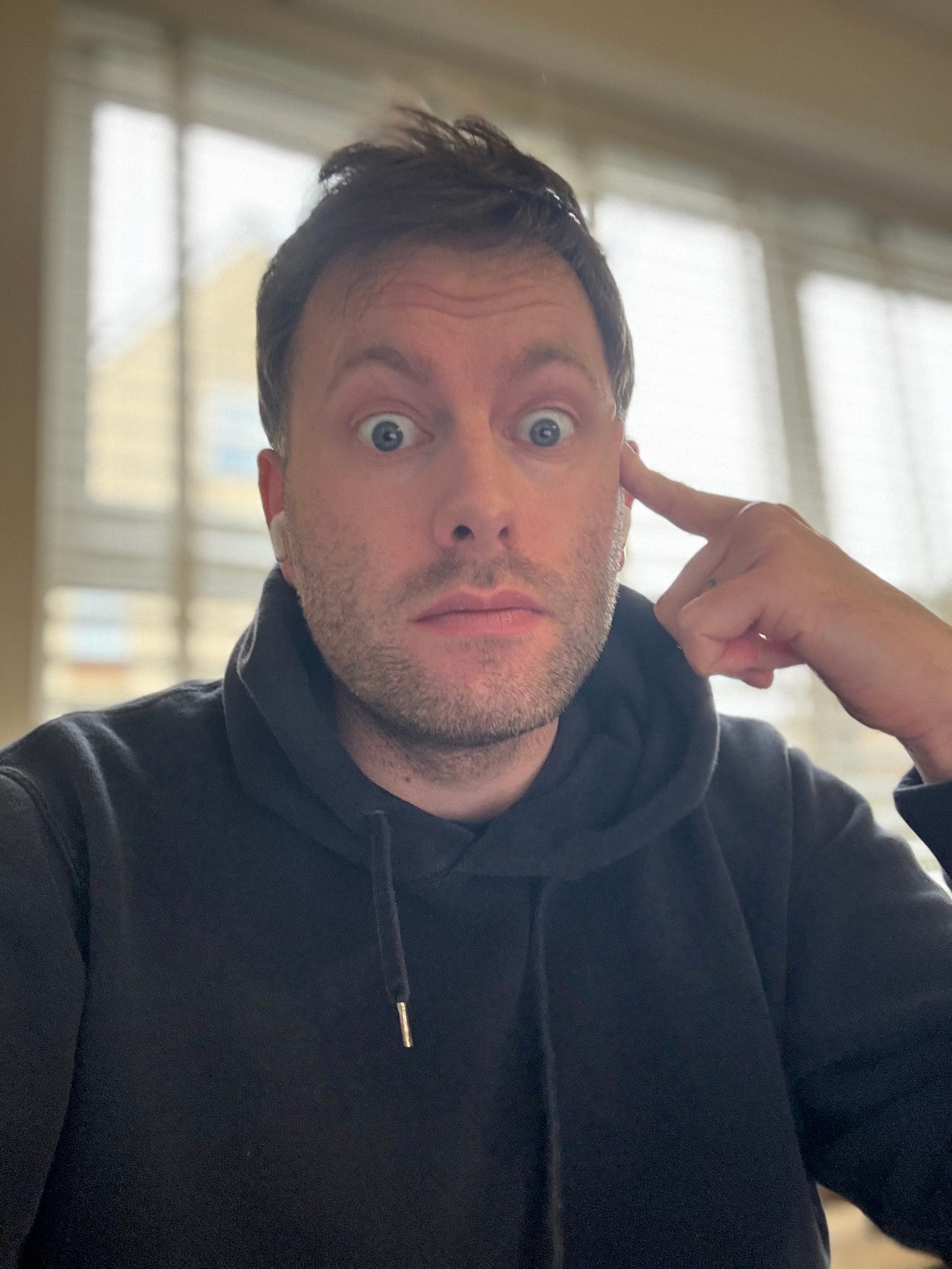Hey Procurement Legends,
I recently published a YouTube video about this.
In short, I’m figuring out what skills are going to be relevant in the age of AI Procurement.
This isn’t easy.
I’m not saying this article is the holy grail and has landed in the right spot.
I’m simply expressing a view, and some thoughts, and I’ll be iterating this throughout 2025.
Procurement is evolving at an unprecedented pace.
AI, digital tools, and shifting business demands are reshaping the industry. If you want to stay relevant and drive real impact, you need to master a new set of skills by 2030.
This isn’t about replacing traditional procurement expertise—it’s about augmenting it with AI, automation, and strategic thinking.
In this guide, we’ll break down ten must-have skills that will define the future of procurement.
These are based on my current experiences working with AI in Procurement, building, and marketing such products.
AI Literacy
AI is no longer a futuristic concept—it’s an essential tool in procurement. I’ve been using AI in procurement since 2020/21 when I was first exposed to this idea.
It blew my mind.
I was using Gatekeeper back then - that’s where I work now - life is strange like this.
From supplier risk analysis to contract management and cost forecasting, AI-powered solutions are already being integrated into procurement technologies. You’re already behind if you’re not current with AI advancements.
I’ve been playing with tech and working on some incredible developments in this space.
The future is bright for us.
But here’s how to start.
To develop AI literacy, start by understanding how AI tools like OpenAI, their LLM interface ChatGPT, and autonomous procurement platforms work. Learn how they integrate into procurement software, their limitations, and how to apply them strategically. AI won’t replace procurement professionals, but those who leverage AI effectively will replace those who don’t.
One word of advice: start playing with this tech early, and don't blame the tech when you don't get what you want. Prompting and working with AI effectively is as much an art as a technical skill. Master it.
Data Interpretation & Usage
Procurement decisions are only as good as the data behind them. AI and automation make extracting insights from large datasets easier. However, it’s still up to procurement professionals to interpret and act on that data (for now—AI Agents will soon be here to assist and even lead). It is now a core competency to understand what data to focus on, how to analyse it, and how to leverage it for strategic decisions.
Use AI-driven analytics tools like Gemini for Google Sheets/CoPilot for Spreadsheets or procurement-specific platforms to uncover cost-saving opportunities, assess supplier performance, and optimise sourcing strategies. The key isn’t just having access to data—it’s knowing how to use it to drive smarter, faster decisions.
Negotiation
A hot topic for me.
Agentic negotiations will gain traction, and whilst this skill has some initial shelf-life for Procurement, I see this one losing relevance over time.
How much time Negotiation has as a must-have skill is beyond me now.
AI may handle some aspects of contract management, but procurement professionals still need strong negotiation skills.
Successful negotiation isn’t just about pushing for the lowest price—it’s about creating win-win scenarios with suppliers and aligning deals with broader business objectives.
Leverage AI to analyse market trends and supplier pricing but rely on human expertise to navigate complex negotiations. Building strong relationships, understanding supplier motivations, and knowing when to push and when to compromise will always be invaluable.
I recently made a YouTube video on Contract negotiations and many howlers I saw over the years.
There were some real bad ones.
Check it out here to learn and laugh (LAL).
Digital Procurement
Procurement is going digital. Organisations that still rely on manual processes are falling behind. Digital procurement tools streamline everything from RFPs to supplier onboarding and contract management, reducing errors and increasing efficiency.
To create digital workflows, start by integrating low-cost project management tools like ClickUp or Notion. Once you prove the efficiency gains, you’ll have a strong case for investing in dedicated procurement software. The goal is to move away from reactive, paper-based processes and embrace a data-driven, automated approach.
Strategic Thinking
This is the skill I’ve seen lacking the most.
I’ve worked in Procurement, Legal, IP, Supply Chain, Contract Management, and Marketing.
Strategic Thinking is too often neglected.
You get lost in the weeds.
Procurement is no longer just about cost-cutting—it’s a strategic function that impacts the entire organisation. Professionals who understand the bigger picture will be invaluable in shaping business decisions.
Shift your mindset from simply managing purchases to driving value.
Align procurement initiatives with company goals, collaborate with finance and operations, and look beyond immediate cost savings to long-term value creation. This means recognising opportunities to drive innovation, mitigate risk, and enhance supplier collaboration.
Supplier Relationship Management
Suppliers are more than just vendors—they’re strategic partners. Strong supplier relationships can lead to better pricing, priority access to new products, and more agile supply chains.
Develop a data-driven approach to supplier management. Implement KPIs and SLAs to measure supplier performance and use AI-driven insights to identify areas for improvement. Regular performance reviews, open communication, and a partnership mentality will ensure suppliers are aligned with your business goals.
I worked in a team that relentless focused on all of this at 10x Banking.
It was an incredible vibe.
We made amazing things happen and were pretty good on the whole alignment piece as well.
I’m a big advocate of SRM.
Change Management
AI and automation are driving rapid change in procurement, and not everyone adapts easily. Change management ensures smooth transitions, gets stakeholder buy-in, and ensures teams adopt new technologies effectively.
Even if you’re not in a leadership position, you can drive change by demonstrating the benefits of new tools and processes. Help colleagues navigate digital transformation, share insights on AI-driven efficiencies, and advocate for innovation within your organisation.
Cost Optimisation
Cost optimisation isn’t just about cutting expenses—it’s about finding smarter ways to manage procurement budgets without sacrificing quality or efficiency. AI-powered spend analysis tools can highlight redundant expenses, unused subscriptions, and supplier overlaps.
Instead of a brute-force approach to cost-cutting, use a data-driven strategy. Identify categories where consolidation can drive savings, negotiate better terms with key suppliers, and eliminate unnecessary spending without damaging supplier relationships.
Cross-Functional Collaboration
Procurement doesn’t operate in a vacuum. Aligning procurement with finance, operations, and other business units ensures that sourcing strategies support overall business goals.
Work closely with stakeholders to understand their priorities and pain points. If procurement is isolated, it will always be seen as a back-office function rather than a strategic driver. Build relationships, share insights, and demonstrate how procurement decisions impact the broader organisation.
Lifelong Learning
Procurement is changing fast, and professionals who aren’t continuously learning will fall behind. AI, automation, and digital transformation will keep evolving, so staying informed is non-negotiable.
Follow industry thought leaders, take relevant courses and stay updated on emerging procurement technologies. Be open to new methodologies and challenge yourself to learn beyond traditional procurement practices. The professionals who commit to continuous learning will lead the procurement's future.
For all of you serious about being a lifelong learner in Procurement, I urge you to upgrade your membership to "The AI Procurement Blueprint" to access our Paid Community only content, and truly upgrade your AI in procurement knowledge.
Here’s what Procurement Pioneer Clive had to say about us ✌️
Conclusion
The procurement landscape is shifting fast, and these ten skills will define success by 2030. AI literacy, data interpretation, negotiation, digital procurement, strategic thinking, supplier management, change management, cost optimisation, cross-functional collaboration, and lifelong learning are no longer optional—they’re essential.
Procurement professionals who embrace these skills will drive efficiency, deliver value, and future-proof their careers. The question isn’t whether AI will change procurement—it already has. The real question is: Are you ready to evolve with it?
PS. keeping this real with a pre-publish selfie after getting lost down the AI rabbit whole for most of this year. Just coming up for some air now before I’m back to work and hopping on the Peloton.
And to remind you that I’m a real human behind this content 🤣












Great post, especially important is the part about continuous learning. AI is an emerging technology, so the learning just starts!